19 Crazy Moments From All In The Family That Would Never Air Today
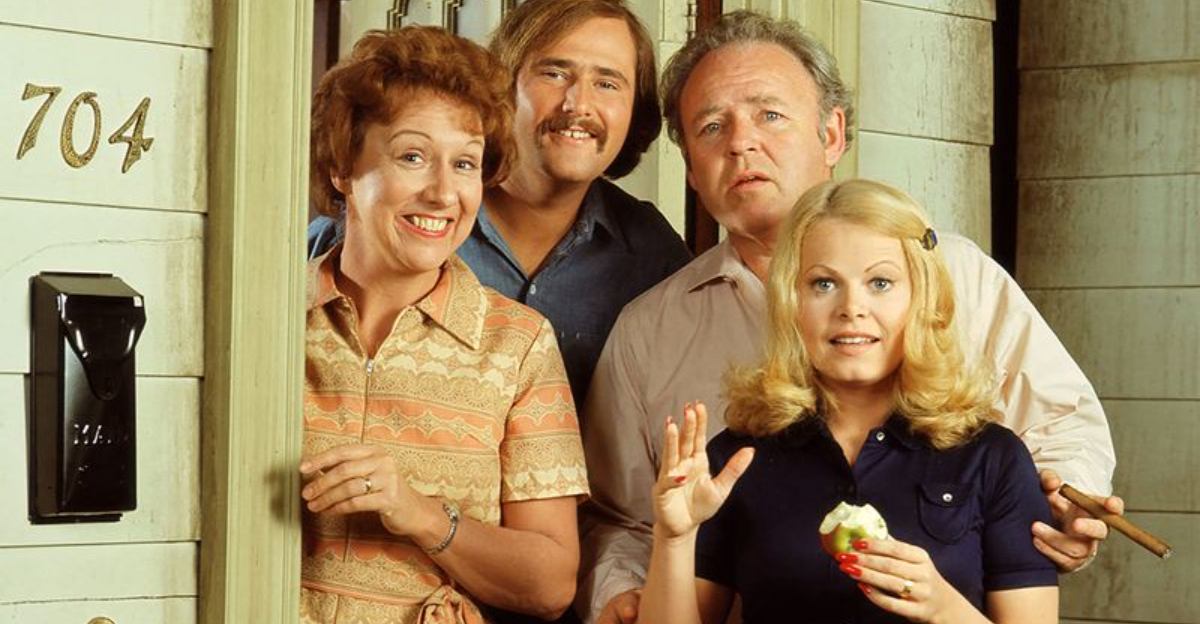
When All in the Family premiered in 1971, it didn’t just entertain—it revolutionized American television.
With sharp wit and fearless storytelling, creator Norman Lear set out to challenge societal norms, using the loudmouthed, unapologetically prejudiced Archie Bunker as a vehicle to expose and critique the biases simmering beneath the surface of everyday life.
The show tackled subjects like racism, sexism, and politics—topics that were rarely, if ever, discussed openly in sitcoms at the time. Viewers roared with laughter, often uncomfortably, as they confronted their own beliefs through the character’s outrageous remarks.
What audiences accepted—or even applauded—fifty years ago would likely send today’s network censors scrambling. These unforgettable and often shocking moments from All in the Family highlight just how dramatically the boundaries of television content have shifted since the 1970s.
1. Edith’s Harrowing Assault Storyline
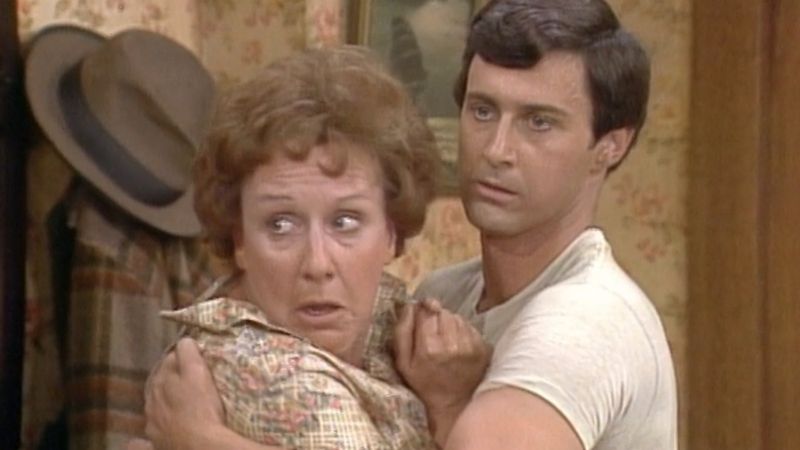
The two-part episode “Edith’s 50th Birthday” remains one of television’s most disturbing moments. A man posing as a police detective attempts to sexually assault Edith while she’s home alone. The raw intensity of Jean Stapleton’s performance as the terrified Edith fighting for her life created television that was brutally honest about violence against women.
What’s remarkable isn’t just the subject matter but how the episode unfolds in near real-time, creating unbearable tension. The camera doesn’t cut away during the most frightening moments, forcing viewers to witness Edith’s terror and resourcefulness.
While modern shows certainly address sexual assault, the graphic nature of this attempted rape played for a family audience – and especially the way it balanced humor with horror in the same episode – would be considered too traumatic for network television today.
2. Archie’s Casual Racial Slurs
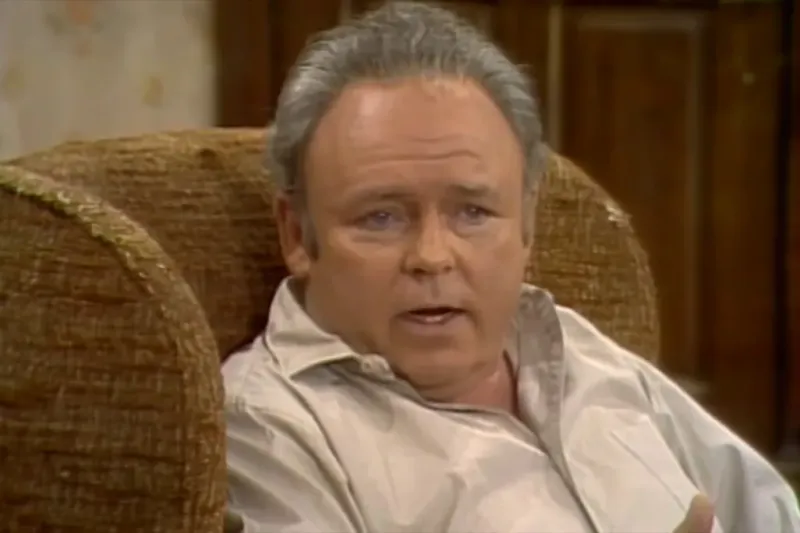
Throughout the series, Archie Bunker freely used racial epithets that would be completely unacceptable in modern television. His vocabulary included offensive terms for Black Americans, Puerto Ricans, Asians, and virtually every ethnic group he encountered.
Carroll O’Connor brilliantly portrayed Archie as both laughable and pitiable – a man whose worldview was shaped by fear and limited education. While the show clearly positioned his prejudice as wrong, the casual nature of the slurs and their frequency would never make it past network censors today.
Modern sitcoms might feature racist characters, but they typically use coded language or get bleeped. ‘All in the Family’ let those words ring out unedited, believing that exposing bigotry was more effective than sanitizing it.
3. The Unexpected Swinger Party
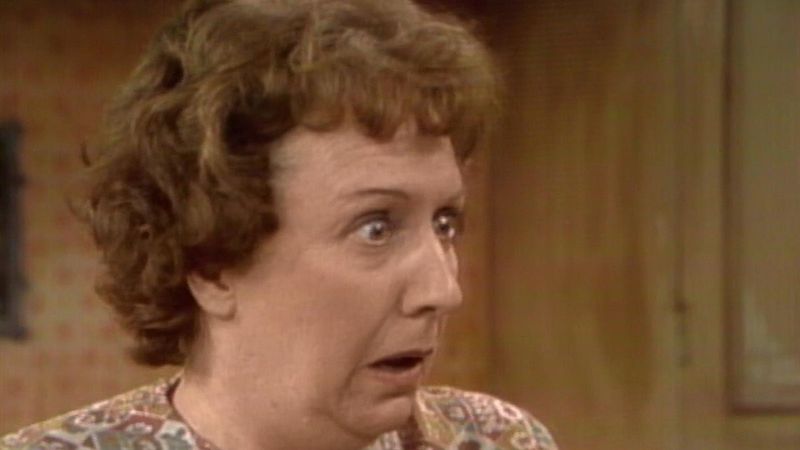
One of the show’s most eyebrow-raising episodes, “The Bunkers and the Swingers,” features Edith responding to a magazine personal ad from a couple seeking new friends. Her naivety leads to a hilarious misunderstanding when she invites a couple interested in wife-swapping over for dinner, completely oblivious to their intentions.
The episode treats open marriages and partner-swapping with remarkable frankness for early 1970s television. What makes it especially bold is how the swingers are portrayed not as deviants but as normal, friendly people with different lifestyle choices.
Today’s network television rarely addresses non-monogamous relationships, and when it does, it’s typically with much more subtlety. The casual discussion of spouse-swapping over cocktails in the Bunkers’ living room would be considered too explicit for primetime family viewing in our supposedly more progressive era.
4. Sammy Davis Jr.’s Iconic Kiss
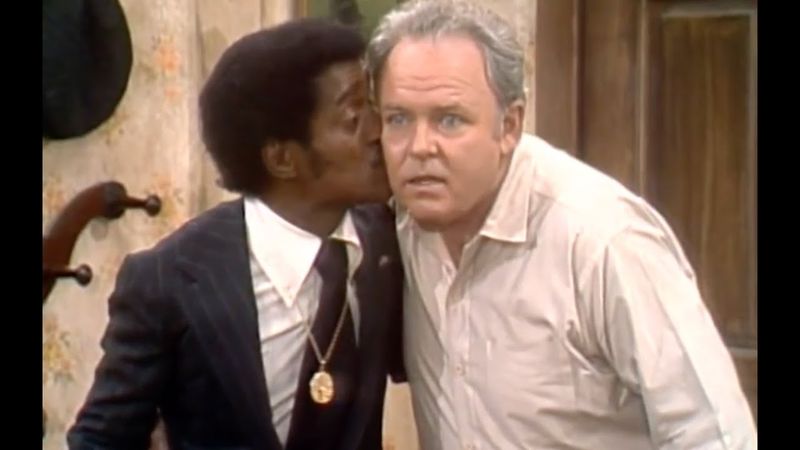
When Sammy Davis Jr. guest-starred as himself in a 1972 episode, he delivered one of television’s most shocking moments by planting a kiss on Archie Bunker’s cheek. The audience eruption lasted nearly half a minute – the longest recorded laugh in sitcom history at that time. The kiss wasn’t just funny; it was revolutionary.
The episode brilliantly built tension as Archie fawned over the celebrity while still making racist remarks, unaware Davis could hear him. When Davis finally turns the tables with that unexpected kiss, it became a perfect commentary on Archie’s hypocrisy and discomfort with physical contact across racial lines.
While interracial kisses are no longer controversial, the way this scene played Archie’s discomfort for laughs – rather than condemning it outright – would likely be considered insensitive to racial dynamics in today’s more nuanced television landscape.
5. Archie’s Bathroom Panic Attack
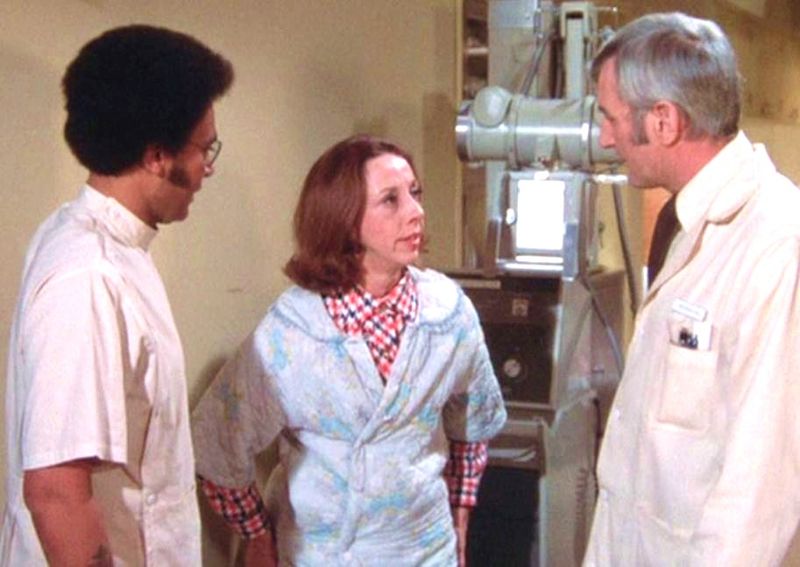
An unforgettable episode features Archie experiencing what modern viewers would recognize as a panic attack while trapped in an elevator with several strangers, including a pregnant woman who goes into labor. His desperate need to use the bathroom creates both comedic tension and genuine discomfort as he fights against his physical needs.
What makes this scene particularly shocking by today’s standards is how graphically Archie describes his bodily functions and the extended focus on his bathroom emergency. Carroll O’Connor’s physical performance – sweating, grimacing, and doubling over – left nothing to the imagination.
While bodily humor remains a sitcom staple, the prolonged, explicit nature of this bathroom emergency played for laughs would likely be considered too crude for family viewing today. Modern sitcoms tend to imply rather than explicitly detail such physiological distress.
6. The Draft Dodger Christmas Dinner
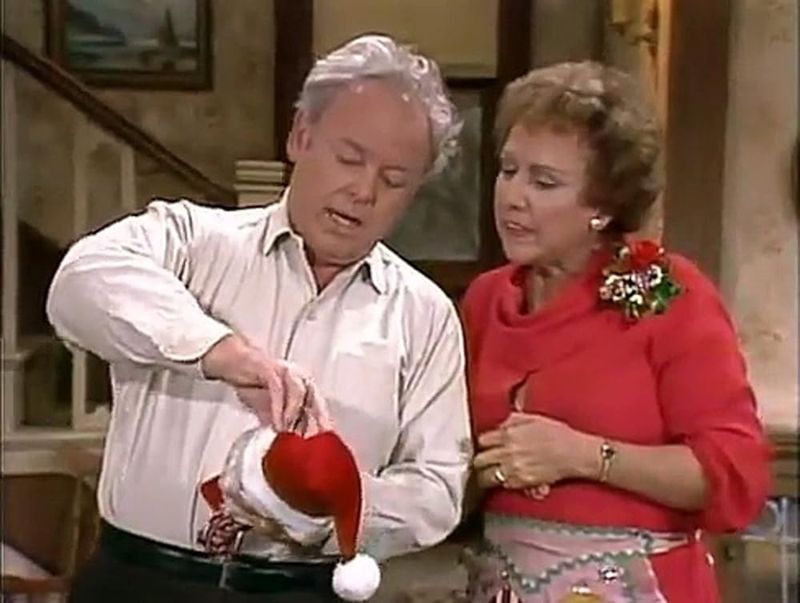
One of the show’s most politically charged episodes features a Christmas dinner where Archie unknowingly hosts both a draft dodger who fled to Canada and a grieving father whose son died in Vietnam.
What makes this episode especially powerful is that it gives thoughtful arguments to both perspectives. The draft dodger isn’t portrayed as a coward but as someone with moral convictions, while the father’s grief isn’t dismissed as blind patriotism.
Modern television tends to avoid such direct confrontations about divisive political issues in sitcom formats. The raw emotion of this episode – especially the father’s grief and Archie’s uncharacteristic speechlessness when faced with real human consequences of war – would be considered too politically charged for today’s fragmented audience.
7. Archie’s Homemade Bomb Shelter
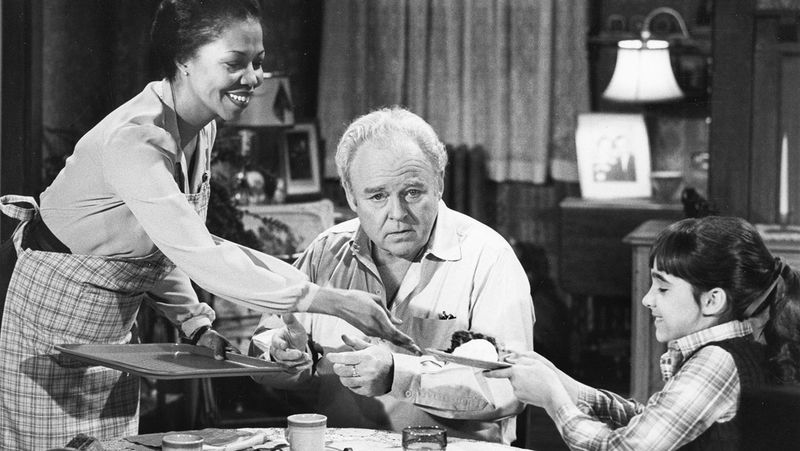
Paranoid about nuclear war, Archie converts part of his home into a makeshift bomb shelter in an episode that treats potential atomic annihilation as comedy fodder. He stockpiles supplies and creates elaborate survival plans while his family mocks his preparations as unnecessary overreaction.
The casual way the show handles nuclear anxiety reflects the Cold War era’s gallows humor. Archie’s detailed descriptions of radiation sickness and his family’s potential deaths were played for laughs in a way that would seem insensitive today.
Modern sitcoms rarely joke about mass casualties or nuclear destruction. The episode’s cavalier attitude toward global catastrophe – especially Archie’s selfish plans to exclude neighbors from his shelter – would likely be considered too dark and politically charged for today’s audiences used to more sanitized network comedy.
8. Edith’s Breast Cancer Scare
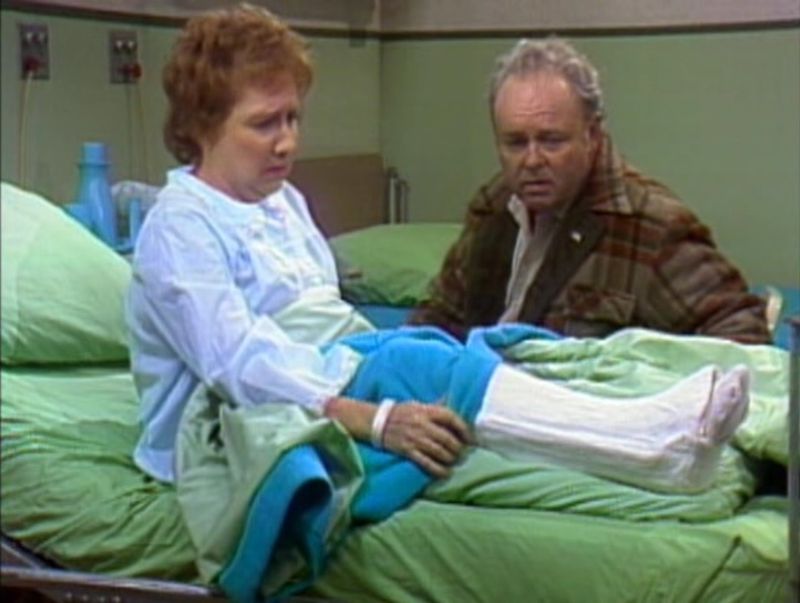
An episode dealing with Edith finding a lump in her breast was groundbreaking television in the 1970s. The frank discussion of breast examinations, cancer fears, and mortality brought women’s health issues out of the shadows and into prime time when such topics were still largely taboo.
What makes this particularly striking is how directly the episode addresses Edith’s terror. She describes the physical examination in detail and contemplates her own death with a vulnerability that’s both heartbreaking and authentic. Jean Stapleton’s performance captured the raw emotion of health anxiety without melodrama.
While modern shows certainly address cancer, the unfiltered way this episode handled breast examinations – and especially the way it mixed humor with serious health concerns – would likely be considered too graphic for network television today. Current shows tend to approach such topics with more clinical language and less explicit detail.
9. Mike and Gloria’s Bedroom Antics
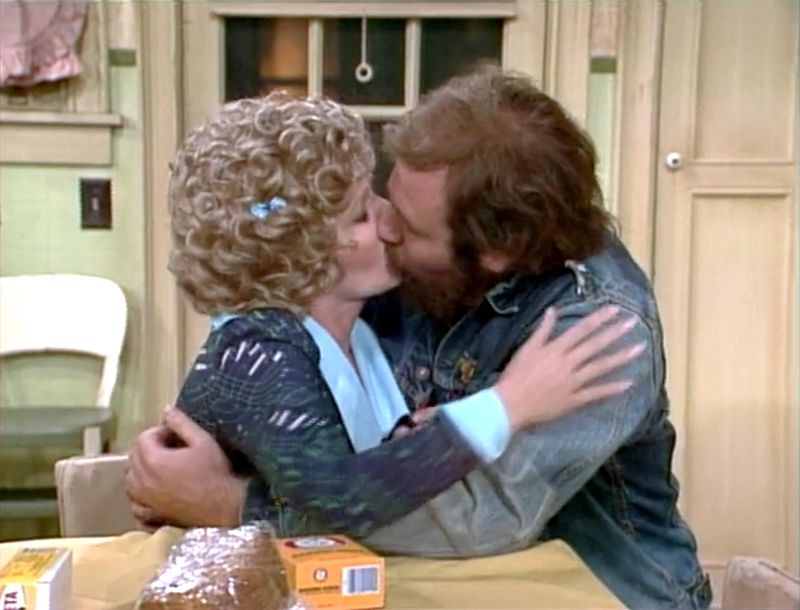
The young married couple Mike and Gloria Stivic living under Archie’s roof provided plenty of opportunities for sexual tension and comedy. Their physical relationship was frequently referenced and even shown – to the extent 1970s television would allow – with scenes of them in bed together and discussions about their sex life that were remarkably frank for the era.
One particularly boundary-pushing episode featured Archie and Edith accidentally walking in on Mike and Gloria in an intimate moment. The scene played their embarrassment for laughs while making it abundantly clear what activity had been interrupted.
While modern sitcoms certainly reference sex, the specific way ‘All in the Family’ positioned the young couple’s healthy sexuality as a contrast to Archie’s prudishness – often making Archie’s discomfort the punchline – would likely be considered too explicit for family viewing hours today.
10. Archie’s Racist Vigilante Group
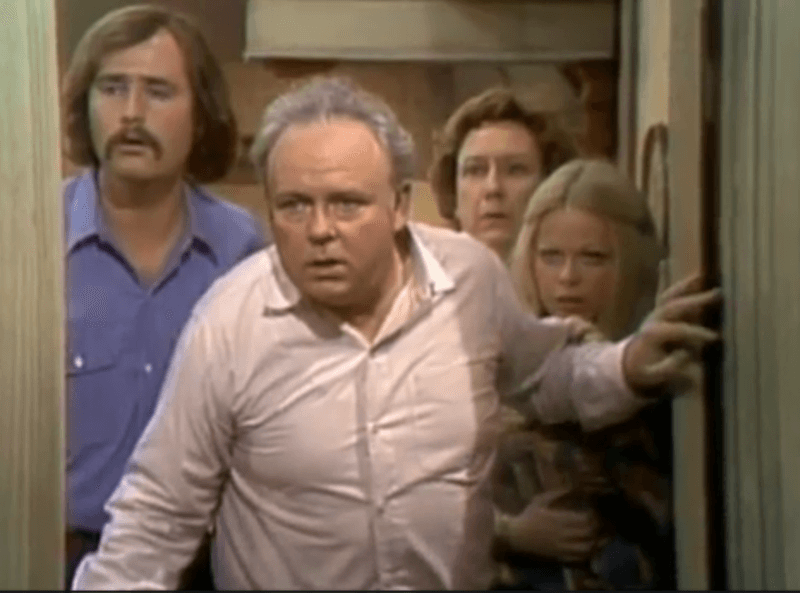
After a local mugging incident, Archie organizes a neighborhood watch group that quickly devolves into what amounts to a racially motivated vigilante squad. His enthusiasm for taking justice into his own hands – and his automatic assumption that the criminals must be minorities – creates uncomfortable comedy that cuts close to the bone even five decades later.
The episode brilliantly exposes how fear transforms ordinary people into potential mob members. When Archie distributes whistles and encourages neighbors to profile “suspicious types” (clearly coded language for racial minorities), the show doesn’t shy away from showing how prejudice fuels vigilantism.
Today’s sitcoms rarely present main characters organizing potentially violent groups, even for comedy. The episode’s willingness to show Archie’s bigotry translating into community action – rather than just remaining personal opinion – would be considered too politically charged and potentially inflammatory for current network television.
11. Edith’s Crisis of Faith
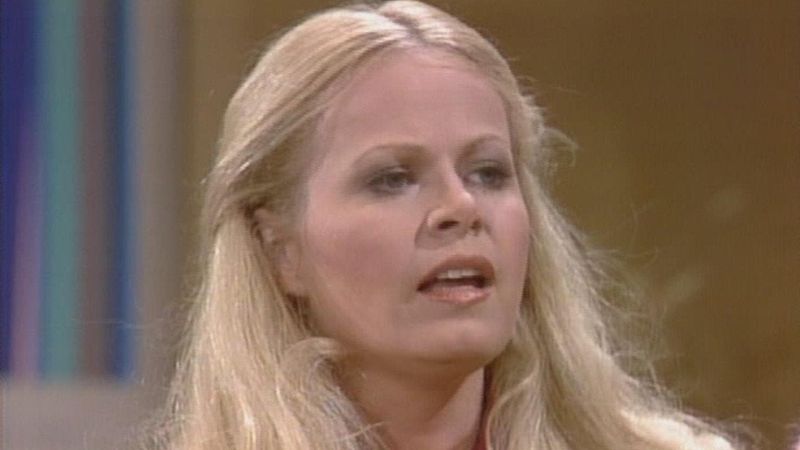
When Edith’s friend Beverly – a female impersonator – is murdered in a hate crime, Edith experiences a profound spiritual crisis. Her struggle to reconcile her religious beliefs with her friend’s lifestyle and tragic death created television that was remarkably nuanced about both faith and LGBTQ+ issues for the 1970s.
The episode doesn’t shy away from Edith’s initial discomfort with Beverly’s identity or her genuine love for him despite her confusion. Her questioning of how God could allow such violence against a good person explores theological depths rarely seen in sitcoms of any era.
While modern shows include LGBTQ+ characters, the specific way this episode frames gender identity through Edith’s religious perspective – and especially its direct portrayal of anti-LGBTQ+ violence – would likely be considered too complex and potentially offensive to multiple audiences for today’s network television.
12. Archie’s Encounter with an Adult Film Star
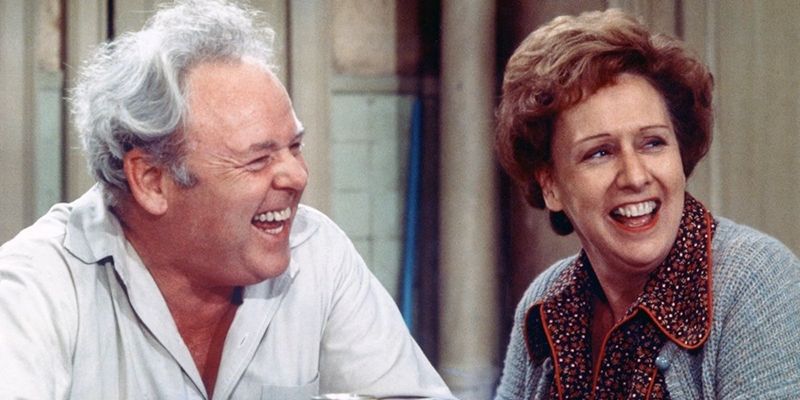
In a particularly risqué episode, Archie unknowingly meets an adult film actress at a bar and is photographed with her, creating potential embarrassment when the photos might become public. The episode’s frank discussion of pornography and sex work created comedy that pushed the boundaries of 1970s television censorship.
What makes this episode especially bold is that it doesn’t completely demonize the adult film industry. The actress is portrayed as an intelligent woman making career choices rather than as simply a victim or object of ridicule.
While modern sitcoms might reference pornography, the relatively sympathetic portrayal of an adult performer – and especially the casual way the episode treats Archie’s interest in adult content – would likely be considered too explicit for network television today.
13. The Jeffersons’ Interracial Marriage Controversy
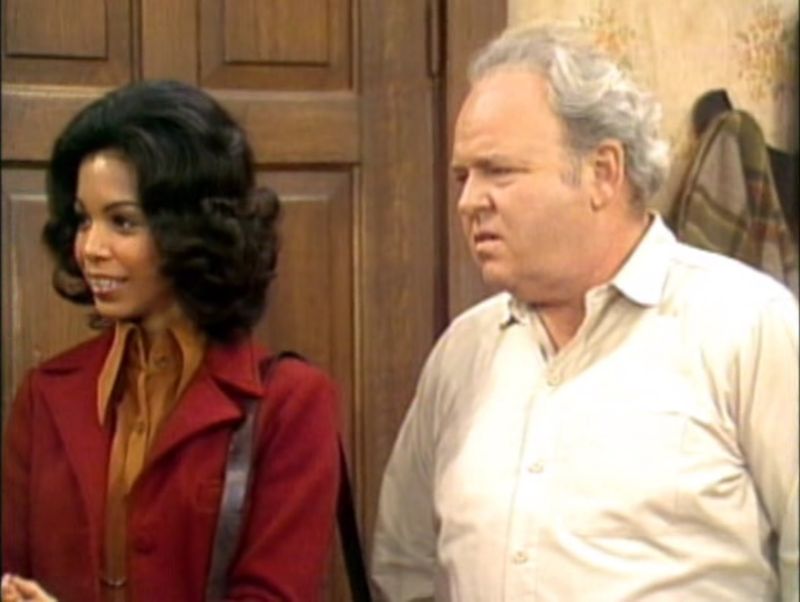
When Archie’s neighbors the Jeffersons are introduced, their son Lionel’s relationship with a mixed-race woman whose mother is white and father is Black creates multiple layers of racial tension. George Jefferson’s opposition to the relationship because of the white mother – mirroring Archie’s prejudice from the opposite direction – was revolutionary television that showed racism exists in all communities.
The episode doesn’t take the easy route of making only white characters prejudiced. George’s character delivers scathing monologues about protecting his family’s Blackness that would be considered highly controversial coming from a Black character on television today.
The episode’s willingness to show complex, sometimes uncomfortable racial dynamics within communities of color – and its refusal to make any character purely heroic or villainous – would likely be considered too nuanced and potentially divisive for current network television.
14. Archie’s Accidental Baptism
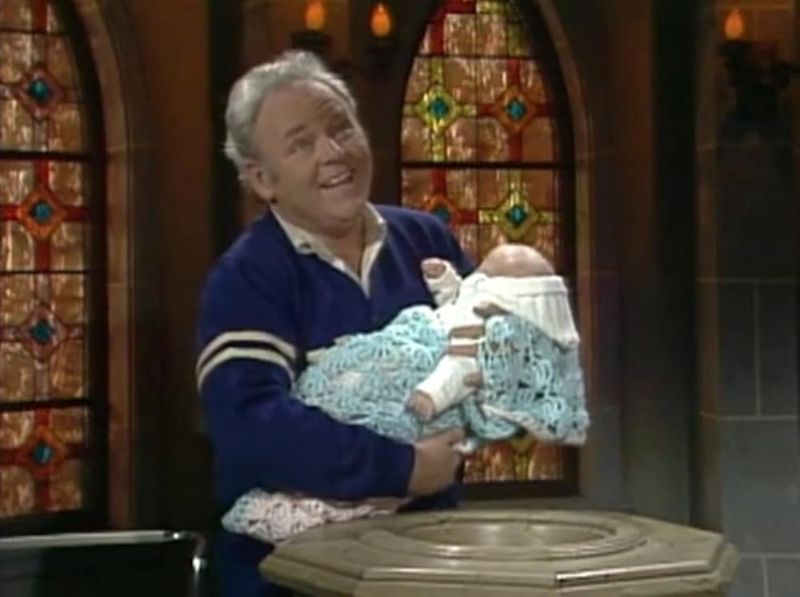
Religion provided fertile ground for controversy on ‘All in the Family,’ especially in an episode where Archie accidentally attends and participates in a baptism at a Black church. His discomfort with both the religious practices and being a racial minority in the space created comedy that walked a fine line between mocking ignorance and respecting faith traditions.
The scene showing Archie’s shocked reaction to the enthusiastic worship styles – including speaking in tongues and faith healing – would likely be considered disrespectful to religious communities today. His wide-eyed panic and attempts to escape create comedy at the expense of Black church traditions.
While modern shows might feature characters experiencing different religious practices, the specific way this episode mines Archie’s racial discomfort for laughs – and potentially makes the church members seem exotic or strange through his perspective – would probably be considered too insensitive to diverse spiritual practices for today’s more culturally aware television landscape.
15. Gloria’s Feminist Awakening
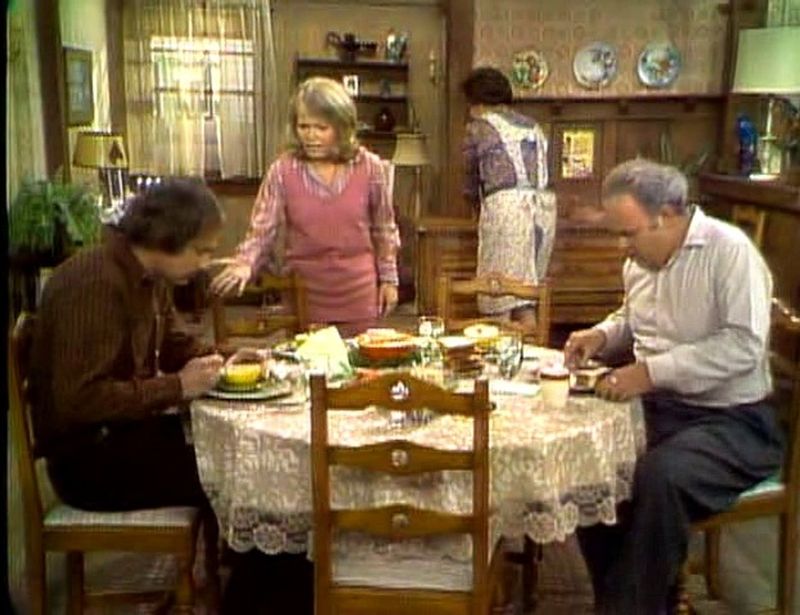
Gloria’s embrace of women’s liberation created some of the show’s most politically charged moments, particularly when she debates her father about gender roles. In one memorable episode, she refuses to serve Mike dinner, leading to heated arguments about a woman’s place in marriage that were revolutionary for 1970s television.
Sally Struthers delivers passionate feminist monologues that directly challenge patriarchal assumptions. The episode doesn’t shy away from terms like “male chauvinist pig” or from Gloria’s anger at being expected to be subservient to her husband.
While modern shows certainly support gender equality, the confrontational nature of these debates – and especially the way Gloria’s feminism is sometimes portrayed as threatening to family harmony rather than unquestionably positive – would likely be considered too politically divisive for today’s network television.
16. Archie’s Vasectomy Dilemma

Male reproductive health rarely featured in 1970s sitcoms, which made the episode focusing on Archie considering a vasectomy groundbreaking television. His terror about the procedure and concerns about how it might affect his masculinity created comedy that was remarkably frank about male sexuality and medical fears.
Carroll O’Connor’s physical comedy as Archie protects his groin area whenever the procedure is mentioned highlighted male anxieties rarely discussed on television. The detailed descriptions of the surgery and recovery process pushed the boundaries of what was considered appropriate for family viewing.
While modern shows might reference vasectomies, the extended focus on Archie’s genitals and sexual performance – and especially the way the episode links the procedure to questions about manhood – would likely be considered too explicit and potentially offensive for network television today.
17. The Loaded Gun Episode
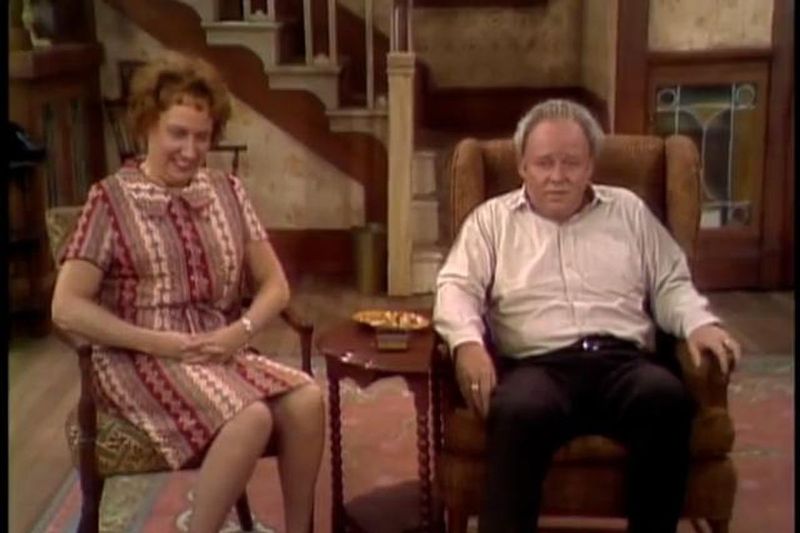
When Archie purchases a handgun after a home in the neighborhood is burglarized, the show tackles gun ownership with a complexity rarely seen in sitcoms. The episode doesn’t take a simple anti-gun stance but instead shows Archie’s genuine concerns about protecting his family alongside the very real dangers the weapon introduces to his home.
The climactic scene where Mike discovers Archie’s loaded gun and confronts him creates tension that blends comedy with genuine danger. The argument about gun rights versus safety concerns presents both perspectives with surprising nuance for a sitcom.
While modern shows certainly address gun control, the balanced portrayal of both pro-gun and gun control arguments – without clearly endorsing either position – would likely be considered too politically controversial for today’s polarized audience.
18. Archie’s Bar’s Cross-Dressing Night
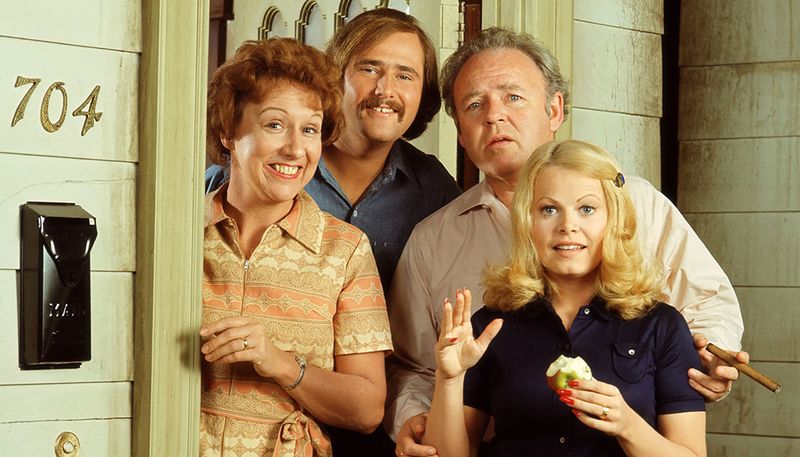
In later seasons after Archie buys a bar, an episode features him unknowingly hosting a gathering of cross-dressers and transgender women. His shock upon realizing the women in his establishment were assigned male at birth creates comedy that would be considered highly problematic by today’s standards of LGBTQ+ representation.
While progressive for its time in simply acknowledging transgender existence, the frequent misgendering and focus on Archie’s discomfort rather than the patrons’ humanity would not meet current standards for respectful representation.
The episode’s use of outdated terminology and its portrayal of Archie’s disgust as understandable rather than clearly prejudiced would likely be considered too insensitive for today’s more LGBTQ+-aware television landscape.
19. Edith’s Menopause Episodes
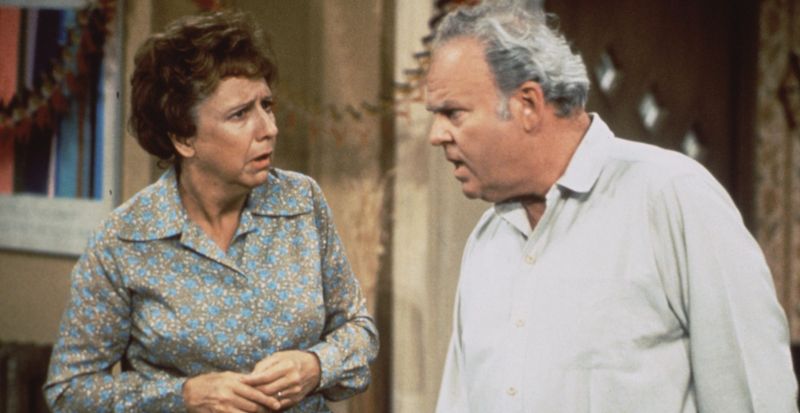
The series broke significant ground with its portrayal of Edith going through menopause, a women’s health issue rarely discussed on television in any era, let alone the 1970s. Her mood swings, hot flashes, and emotional volatility were played both for laughs and for genuine human drama in ways that were revolutionary for the time.
Jean Stapleton’s performance captured the physical discomfort and psychological impact of hormonal changes with remarkable authenticity. The episodes didn’t shy away from showing Edith sweating profusely, removing layers of clothing, and experiencing sudden emotional outbursts that confused her family.
While modern shows occasionally reference menopause, the extended, graphic portrayal of symptoms – and especially the way the episodes mine both comedy and drama from Edith’s physical changes – would likely be considered too explicit about female bodily functions for network television today.
